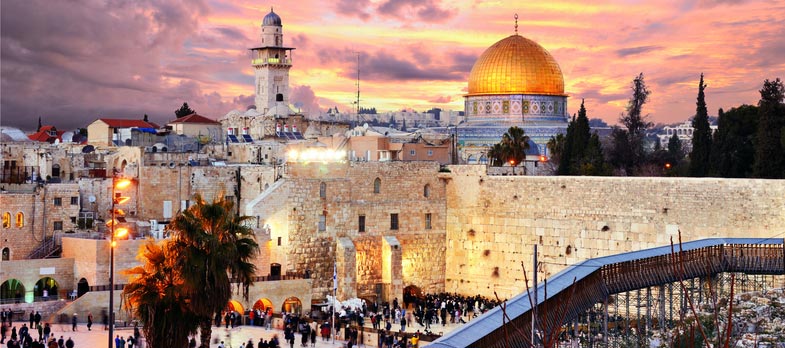Religious leader Muqtada al-Sadr, who also has ties to the anti-American Mahdi Army militia, recently said that moving the American embassy in Israel from Tel-Aviv to Jerusalem would be tantamount to a “declaration of war against Islam” that might lead to another jihad (holy war) against the United States. His statement prompted immediate concerns for the safety of the sprawling 104-acre American embassy in Baghdad, if President Donald Trump follows up on plans to move the American mission in Israel.
In December 2016, Ambassador-designate David Friedman remarked that he looked forward to working from an embassy in Jerusalem instead of Tel-Aviv, though the administration had set no “timetable” for recognizing Jerusalem as the official capital of the world’s only Jewish state. Mr. Friedman also drew the ire of some Arabs when he suggested that it would not be illegal for Israel to annex Jewish settlements in the disputed West Bank. If President Trump does make the proposed move, Mr. al-Sadr said that Muslims should form “a special division to liberate Jerusalem.” Leading international organizations, such as the Arab League and the Organization of Islamic Cooperation, should take action as well, he added. Mr. al-Sadr also warned officials in Iraq to close the American embassy in Baghdad if Trump relocates the official American presence in Israel. Earlier in January 2017, Palestinian Authority supreme Shari’ah judge Mahmoud al-Habbash made similar comments. “The new American administration intends to transfer its embassy to Jerusalem. In a simple, calm, and rational manner, in clear words that need no explanation and which are unambiguous: Such a step, for every Muslim, is a declaration of war on all Muslims,” he insisted.
According to Mr. al-Habbash, many Palestinians consider “occupied Jerusalem” to be “our eternal capital, the capital of our existence and the capital of our state.”
American Embassy in Baghdad
Many United States embassies are impressive edifices that cost millions of dollars to build because in the absence of military intervention, which is not very high on any politician’s wish list, the embassy is the most visible sign of American wealth, power, and prestige. So, the fact that the American embassy in Baghdad is the largest and arguably most impressive embassy in the world places this building at the head of a very impressive class.
The $750 million complex is not yet ten years old, having opened in January 2009 after a string of frustrating delays. The embassy employs over 15,000 people, and many of these workers provide security for the highly-fortified structure. Even by IZ (International Zone) standards, the embassy’s defensive layout is impressive, complete with extended security perimeters, reinforced structures that are almost bomb blast-proof, and five very heavily-guarded entrances.
Camp Condor (Amarah Air Base) is almost directly adjacent to the embassy, providing additional security.
Construction Projects in MENA
Rebuilding efforts are critical to the American mission in the Middle East/North Africa region. If the infrastructure in war-torn areas is not completely rebuilt, the civilian population will most likely not relocate to that area, giving dangerous militants a chance to expand their power bases. Many observers expect Syria to be the next major rebuilding project, and the World Bank estimates that cost could exceed $180 billion.
Most construction projects in America have almost no security, other than a perimeter fence and perhaps an unarmed patrol officer. But construction in many parts of the Middle East, especially where anti-American sentiment and/or ISIS activity are relatively high, is a dangerous business. In fact, in some projects, the paramilitary contingent protecting the workers may almost as large as the construction workforce. These guards are nearly always private military contractors, because the types of duties they perform (checking ID badges, escorting VIPs, and serving as a visible deterrent) are right in line with many contractor responsibilities with the U.S. Army and other government groups.
To save money and to curry favor with local religious groups, most of the non-supervisory workers are native people, at least in most cases. The managers, supervisors, and planners are usually foreign workers, and typically they are highly sought-after workers who have some experience working with construction projects in that area of the world.
Compensation for Injured Workers
If they are injured while in-country, and that injury is rationally related to their job duties, the Defense Base Act covers all these employees. The DBA provides benefits to injured victims who worked in support of U.S. interests overseas, and in some cases, it also covers workers employed by some friendly foreign governments. Workers do not have to be U.S. citizens to receive benefits including:
- Wage Replacement: Most victims receive two-thirds of their average weekly wage while they recover from their injuries, and most noncash compensation, like a housing allowance, is included in the AWW calculation.
- Medical Benefits: Typically, the insurance company pays providers directly and victims are not responsible for any unpaid charges.
To learn more about the DBA process, contact Barnett, Lerner, Karsen & Frankel.

